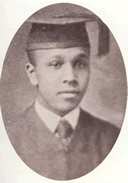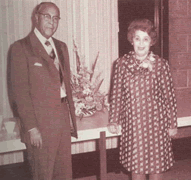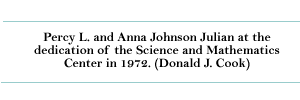
<<
Back
Percy
Lavon Julian was born in Montgomery, Alabama in 1899. He was the
grandson of a slave and the oldest child of James Sumner Julian,
a railway mail clerk, and Elizabeth Adams Julian, a schoolteacher.
After graduating from a small normal school in his home town, he
entered DePauw University as a "subfreshman" in the fall
of 1916. At first he lived in the attic of a fraternity house, where
he worked as a janitor and waiter in return for room and board.
Later his parents moved to Greencastle to establish a home for Percy
and his two brothers and three sisters, all of whom eventually graduated
from DePauw.
 
Percy quickly made up his academic deficiencies and majored in chemistry
under the guidance of Professor William M. Blanchard. The southern-born
Blanchard recognized his protégé's scientific potential
but recommended that he find a teaching position in a black college
after graduation rather than undertake advanced training, because
his skin color would limit his chances for success as a chemist.
Graduating from DePauw in 1920 at the top of his class, Percy accepted
an instructorship in chemistry at Fiske University. Two years later
he received a fellowship to study at Harvard, where he earned an
M.A. in 1923. After two more years spent at Harvard on various research
grants, he went to West Virginia State College for Negroes and later
to Howard University to teach chemistry. Taking leave to study at
the University of Vienna, where he received a Ph.D. in 1931, Julian
found his career momentarily blocked at Howard and had to look elsewhere
for a suitable position.
In 1932 his old mentor Professor Blanchard, now academic dean of
DePauw University, invited Julian to return to his alma mater as
a research associate in organic chemistry. For four years Julian
carried on research in Minshall Laboratory that led to the successful
synthesis of physostigmine, a drug used in the treatment of glaucoma.
But DePauw lost the opportunity to retain the services of a brilliant
scientist when the board of trustees proved unwilling to grant the
black chemist a regular faculty position. Instead, in 1936 Julian
became director of research for the Soya Products Division of the
Glidden Company in Chicago.

During 17 years with that company he developed such products as
fire-fighting foam and perfected methods for the mass production
of hormones. In 1953 he formed his own company, Julian Laboratories,
Inc. with headquarters in Franklin Park, Ill. and branches in Mexico
and Guatemala. One of his major accomplishments was a process for
the commercial production of the arthritis drug cortisone. Eventually
selling the company to two large pharmaceutical firms, he organized
Julian Associates and the Julian Research Institute in 1964, continuing
his work as a research scientist and consultant until his death
in 1975.
Throughout his life Julian maintained a deep interest in DePauw
University, visiting the campus frequently as a guest lecturer,
becoming a trustee in 1967, and even purchasing a farm near Greencastle
as a country retreat. After his death his widow, Dr. Anna Johnson
Julian, and their children, Faith and Percy Jr., established a trust
fund to support research programs in the university's chemistry
department and an annual Percy L. Julian Memorial Lecture. Also
included was a scholarship fund to enable talented students to prepare
themselves for careers in chemistry or related fields. Finally,
in 1980 DePauw University rededicated the recently constructed building
housing the mathematics and physical science departments as the
Percy L. Julian Science and Mathematics Center.
Back
to Top
<<
Back
|





